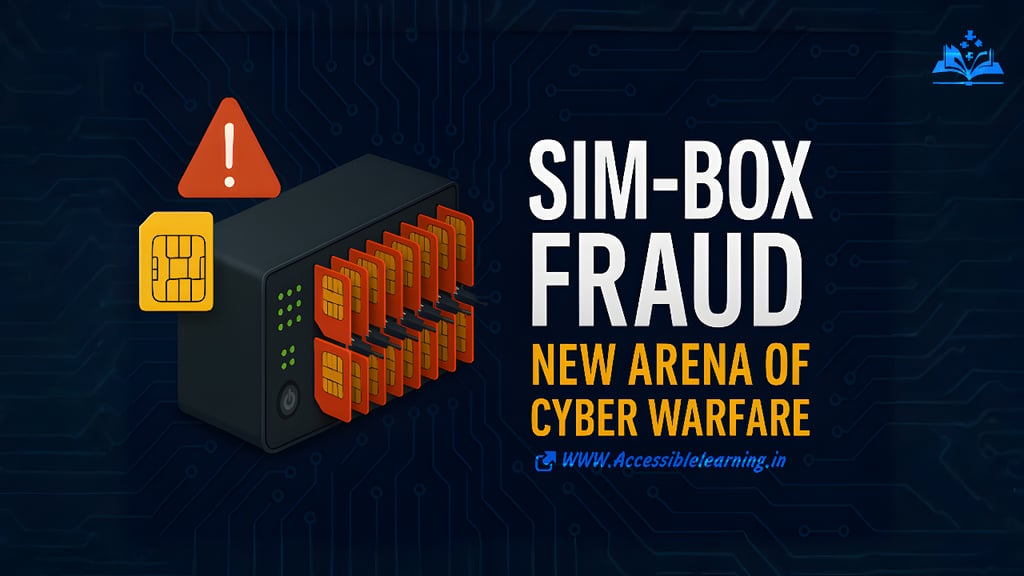
SIM-BOX FRAUD: THE NEW ARENA OF CYBER WARFARE
SIM-box fraud is more than telecom theft—it’s a rising weapon in cyber warfare. Discover how SIM farms bypass networks, fuel organized crime, aid espionage, and threaten national security, along with real-world cases, impacts, and defenses.
SCAMNEPOTISM/SOCIAL ISSUESAWARE/VIGILANT
Kim Shin / Keshav Jha
10/10/20256 min read


In the digital era, cyber warfare is no longer confined to malware, ransomware, or data breaches. A quieter yet equally dangerous form of attack has emerged: SIM-box fraud. Initially designed to bypass telecom fees, it has evolved into a sophisticated tool for organized crime, financial scams, and even geopolitical operations. This makes SIM-box fraud not just a telecom issue but a global cybersecurity challenge with real-world consequences.
What exactly is SIM-box fraud?
A SIM-box (also known as a GSM gateway) is a hardware device that contains dozens, hundreds, or even thousands of SIM cards. These devices are controlled remotely by fraudsters to reroute international calls as if they were local calls.
The goal: avoid international termination charges, undercut telecom operators, and profit from selling cheaper international calling services.
However, its true danger lies in its ability to mask identity, hide geolocation, and enable anonymous large-scale communication—a perfect weapon for criminals and cyberwarfare actors.
The global scale of the problem
Billions lost: The Communications Fraud Control Association (CFCA) estimates that bypass fraud, including SIM-boxing, costs telecom operators $3–6 billion annually.
Developing nations hardest hit: Countries in Africa, South Asia, and Latin America are frequent targets because of high international call rates and weak telecom oversight.
Consumer distrust: Callers often face dropped calls, poor quality, or scams masked as local numbers—eroding trust in telecom services.
How SIM-box fraud operates step by step
International call is initiated → Normally, carriers charge a high termination fee.
Traffic hijacked via VoIP → Fraudsters convert calls into digital streams.
Rerouted into SIM-box → Located in the destination country, loaded with multiple SIMs.
Local disguise → The call is injected into the local mobile network, showing as a local call.
Fraudster profits → Customers pay less, but telecom operators lose revenue.
What seems like a small technical trick can scale into millions of calls per day, with fraudsters rotating SIMs and disguising traffic to evade detection.
Beyond money—the hidden dangers
SIM-box fraud is dangerous not just because of lost telecom revenue, but because it opens doors to much larger risks:
Criminal anonymity: Fraudsters, scammers, and even terrorist networks use SIM-boxes to hide call origins.
Scam enabler: Voice phishing (vishing), fake loan calls, and harassment campaigns are often powered by SIM farms.
Obstructing investigations: When law enforcement traces a threatening or extortion call, it leads only to a local SIM — not the true origin.
National security risk: During elections or unrest, coordinated disinformation or intimidation campaigns can be launched using SIM-boxes, making them a tool of psychological warfare.
Financial fraud: Hackers exploit SIM-boxes to bypass two-factor authentication (2FA) via SMS, intercepting OTPs to steal banking and payment credentials.
Why SIM-box fraud is hard to stop
Fraudsters are constantly adapting:
SIM rotation: Thousands of SIMs are swapped automatically to mimic normal users.
Human-like patterns: AI-driven systems adjust call times and lengths to avoid suspicion.
Insider collusion: Some fraudsters bribe telecom employees to supply bulk SIM cards.
Global networks: SIM-box operations are often cross-border, with servers, gateways, and SIM farms spread across multiple countries.
Corruption and weak laws: In some regions, regulatory loopholes allow SIM-box networks to flourish unchecked.
This cat-and-mouse game makes SIM-boxing one of the hardest telecom crimes to eliminate.
SIM-box fraud in cyber warfare
SIM-boxing has crossed the line from fraud into a weapon of cyber warfare:
Espionage: Hidden call routing helps intelligence operations communicate without being traced.
Election interference: Coordinated call floods or misinformation campaigns can influence voters and silence activists.
Psychological operations (PsyOps): SIM-boxes can be used to launch mass propaganda calls disguised as local community calls.
Terrorist communication: Extremist groups often rely on SIM-box setups for anonymous cross-border communication.
In short, SIM-boxes have become digital weapons disguised as telecom hardware.

Real-world examples
West Africa (2018): Authorities dismantled a SIM-box operation costing local carriers over $5 million annually in revenue. The fraud was also linked to scam calls targeting Europe.
South Asia (2020): Police uncovered SIM farms tied to banking OTP theft, where thousands of accounts were drained using SIM-box-routed SMS interceptions.
Eastern Europe (2022): Security agencies found that SIM-boxes were being used to spread automated propaganda messages during regional political unrest.
Detection and defense strategies
Telecom operators
Use AI-based analytics to detect unusual SIM activity.
Limit bulk SIM sales and enforce stronger KYC (Know Your Customer) policies.
Deploy test-call generators to check if international calls are being terminated locally.
Governments and regulators
Strengthen telecom laws with harsh penalties for SIM-box operators.
Improve international cooperation to track cross-border fraud rings.
Regulate SIM distribution and impose mandatory registration.
Consumers and businesses
Be cautious of suspicious calls from local numbers that claim to be from banks or officials.
Avoid relying solely on voice/SMS OTPs—use app-based or hardware tokens.
Report unusual or repeated scam calls to the operator.
The road ahead
The fight against SIM-box fraud is ongoing, but the battlefield is expanding:
eSIMs & 5G: While they add flexibility, they can also be exploited if not strictly regulated.
AI vs AI: Fraudsters use AI to mimic human patterns; telecoms use AI to catch them—a constant arms race.
Integration with dark web markets: SIM-box services are now sold openly on underground forums, making them accessible to cybercriminals worldwide.
Additional Important Information (not in the main article)
The Dark Web Marketplaces:
SIM-box kits, bulk SIM bundles, and ready-made bypass software are openly traded on dark web forums. Some even offer “Fraud-as-a-Service” packages, where criminals rent SIM farms remotely.Environmental Footprint:
SIM boxes consume large amounts of SIM cards, leading to massive electronic waste. In some countries, fraudsters discard thousands of SIMs monthly, creating an unregulated black market for recycled SIMs.Connection to Migrant Smuggling & Human Trafficking:
Investigations in Europe and the Middle East revealed SIM-boxes being used by smuggling rings to coordinate movements while avoiding traceable international calls.Use in Sanctions Evasion:
Some sanctioned countries use SIM-box routing to bypass telecom restrictions, keeping international communication alive while avoiding detection by global regulators.Artificial Inflation of Traffic (AIT):
Beyond bypassing calls, SIM-box operators sometimes generate fake call traffic between networks to artificially inflate billing records, a tactic increasingly tied to fraudulent telecom arbitrage schemes.Impact on Telecom Innovation:
Because of SIM-box losses, telecom companies often raise prices or delay network upgrades, especially in developing markets. This slows digital growth and widens the digital divide between regions.Future Threat—SIM Farms + AI Voice Bots:
Analysts warn of a possible convergence between SIM farms and AI-driven robocallers. This could enable fraudsters to make millions of personalized scam calls daily—fully automated and almost impossible to trace.
SIM-box fraud is no longer just a “telecom scam.” It is a multi-billion-dollar industry, a cyber weapon, and a shield for criminal anonymity. From financial fraud to political interference, SIM-boxing has proven to be a threat to national security and global stability.
In the era of cyber warfare, protecting communication channels is just as important as securing data. SIM-box fraud is not only stealing money — it is stealing trust, safety, and sovereignty.

Frequently Asked Questions
Q. Why do fraudsters prefer SIM-box fraud over other cybercrimes?
SIM-box fraud offers a low-risk, high-reward model. Unlike direct hacking or credit card fraud, it doesn’t require breaching systems or stealing identities. Instead, it exploits telecom loopholes. With relatively cheap hardware and bulk SIM cards, fraudsters can set up profitable operations that are harder for law enforcement to trace.
Q. Can SIM-box fraud affect emergency services?
Yes. In some cases, SIM-box rerouting causes caller ID manipulation, meaning emergency responders cannot identify or call back the actual caller. This delay can put lives at risk, especially in regions where telecom infrastructure is already weak.
Q. How does SIM-box fraud impact international relations?
When cross-border fraud occurs, governments often accuse one another of harboring criminal networks or failing to regulate telecoms. This can lead to diplomatic tensions, especially when fraud is tied to political propaganda or espionage operations.
Q. Are SIM-box devices always physical hardware?
Traditionally, yes — SIM-boxes are racks with GSM gateways and physical SIMs. But increasingly, virtualized SIM-boxes are emerging, using cloud-hosted GSM emulators or eSIM provisioning exploits. These are harder to detect because they don’t rely on physical SIM farms.
Q. Do telecom companies ever indirectly benefit from SIM-boxing?
In rare cases, rogue insiders within telecom firms enable SIM-box operators by selling bulk SIMs or leaking network access. While companies as a whole lose revenue, individual insiders may profit. This insider collusion is one reason SIM-box fraud persists despite strict regulations.
Q. Can ordinary mobile users unknowingly support SIM-box fraud?
Yes. In some regions, people unknowingly sell their personal SIMs in exchange for small payments, not realizing they are fueling large-scale fraud. Others may be tricked into lending SIMs under the guise of promotional offers or “network testing.”
Q. How do regulators distinguish between high call usage by a business and SIM-box fraud?
This is one of the biggest challenges. A call center or telemarketing company may legitimately make thousands of calls, which can look similar to SIM-box traffic. Regulators rely on behavioral analysis (like sudden SIM rotation, cross-border patterns, and inconsistent call quality) to separate legitimate bulk callers from fraudsters.
Q. Is SIM-box fraud linked to money laundering?
Absolutely. SIM-box operations often run through layered resellers, shell companies, and offshore accounts. The revenue from bypass fraud can be laundered into legitimate businesses or, worse, funneled into organized crime, terrorism, or political influence networks.
Q. Could SIM-box fraud decline with the rise of internet calling apps like WhatsApp or Zoom?
Surprisingly, no. While OTT apps reduce international calling demand, fraudsters adapt by targeting SMS traffic, verification codes, and enterprise communication channels. In fact, as voice margins shrink, fraudsters are shifting towards exploiting A2P (Application-to-Person) SMS traffic, making the problem even more complex.
Q. How does SIM-box fraud connect to cyber warfare in the future?
The future risk lies in hybrid attacks—combining SIM-box rerouting with AI voice cloning, deepfake robocalls, and disinformation campaigns. Imagine thousands of “local” calls spreading fake alerts or impersonating officials during a crisis. That transforms SIM-box fraud into a weaponized psychological tool in modern cyber warfare.
Subscribe To Our Newsletter
All © Copyright reserved by Accessible-Learning Hub
| Terms & Conditions
Knowledge is power. Learn with Us. 📚


